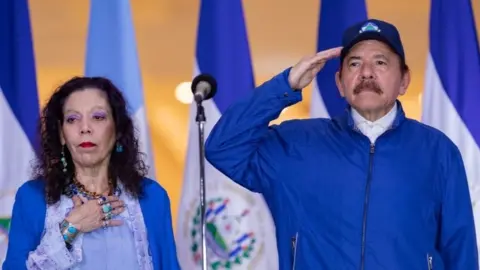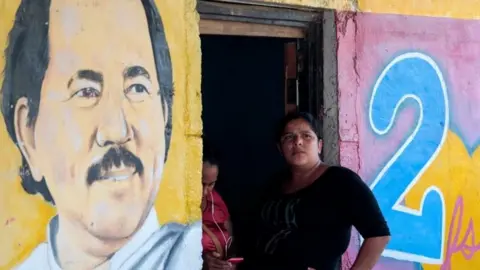Nicaraguan President Ortega denies torture allegations
 Reuters
ReutersNicaraguan President Daniel Ortega has dismissed allegations by jailed critics of his government that they have been tortured in captivity as "lies".
Mr Ortega said that prisoners were "making up" allegations in order to tarnish Nicaragua's image.
His remarks come days after the Organization of American States (OAS) regional body denounced "persistent human rights violations in Nicaragua".
A group of jailed government opponents is currently on hunger strike.
What did Mr Ortega say?
"It's always the same thing," Mr Ortega said at an event celebrating the country's interior ministry. "There are prisoners who make up that they're being tortured."
"They invent things to tarnish the image of Nicaragua," he added.

Read more about Nicaragua's crisis:

He also said that the situation in the country's prisons had improved since he was jailed under the rule of dictator Anastasio Smoza in the 1960s and 70s.
Mr Ortega referred to an OAS statement that said that imprisoned opponents of him had sown their lips together as part of a hunger strike they began on 1 October: "I'd like to see them with their lips sown together. They just make things up!"
What do international organisations say?
According to the OAS, there are 113 "political prisoners" in Nicaragua who are taking part in the hunger strike.
 Reuters
ReutersThe OAS says that "all have been publicly presented as criminals and have not had access to a fair judicial process, thus violating the principle of the presumption of innocence and all their fundamental freedoms".
The Inter-American Commission on Human Rights (IACHR) has documented what it calls "Nicaragua's human rights crisis" since mass anti-government protests broke out in April 2018.
A group of independent experts tasked by the IACHR in 2018 to look into alleged human rights abuses in Nicaragua concluded that "there had been a widespread, systematic attack on civilians that - according to international law - amounts to crimes against humanity, including incarceration and other forms of deprivation of physical liberty, persecution, rape, and torture".
According to the HRW report, detainees were raped, or threatened with rape, and some were subjected to waterboarding, electric shocks, acid burns, mock executions, forced nudity, and removal of fingernails.
The Nicaraguan government has strongly rejected all reports of torture and says it is the victim of a campaign to overthrow it by force.
